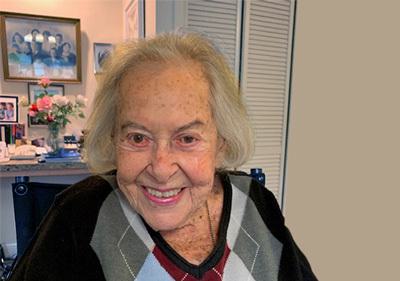Los Angeles Jewish Home Celebrates Centenarian Seniors


Los Angeles Jewish Home Celebrates Centenarian Seniors

Each autumn, communities across the country mark National Centenarians Day, a celebration honoring seniors who have reached their 100th birthday or beyond. Here at the Los Angeles Jewish Home, we have a large number of centenarians who continue to inspire us with their intelligence and spirit. Their longevity is an inspiration to their peers at the Jewish Home and, indeed, to everyone they meet.
Eisenberg Village resident David Konigsberg is one of the Home's centenarians. A World War II hero who flew 65 missions and earned the Distinguished Flying Cross medal, David has spent a lifetime making the world a better place. "Throughout the course of his 10-plus decades," says close friend Bob Gray, "David has been a resource for those he loved—someone who constantly gave back to his community."
"At a difficult time for me, he helped me straighten out a few things in my life, and he was instrumental in my getting married and having kids," Bob recalls. "I'll never forget a letter he once wrote me, in which he said, 'The best way you can help yourself is to help somebody else.' That's David—just an incredibly caring and phenomenal guy."
Bob wasn't the only beneficiary of David's nurturing and compassion. "My dad died when I was 22; Uncle Davey walked me down the aisle at my wedding. He was one of 11 children, but I chose him from among all my uncles to be my surrogate father, and to be the grandfather to my son," says his niece, April Wayland. "He had a way of making everybody feel good, even when things weren't easy for him. To capture the kind of optimism he projected, all you need to know is that he had seven dogs over the course of his lifetime, all of them were named 'Lucky.'"
After so many years of caring for others, David is now able to depend upon the expert care provided by the Jewish Home. "The quality of care at the Home is truly excellent," April says. "I'm so impressed by how well they know him and how carefully they monitor him. It's especially impressive in light of how little money the Jewish Home gets, since most of its residents rely on government benefits. The Home gives much more than it receives, yet its staff still take such amazing care of the seniors in their charge."
Jeanette Crane is another of the Home's Eisenberg Village-based centenarian seniors. At 101, she still possesses the resilient spirit that has kept her going for more than a century. Her son Michael says his mom has always been a trailblazer of sorts. "She's very independent. She and my dad divorced in the early 1970s, when that wasn't done much, and she went to work, first as an executive secretary at the Century Plaza Hotel, and then as part of my brother Jeffrey's company for many years," he remembers.
When she arrived at the Jewish Home about a decade ago, Jeanette quickly embraced the advantages of residential living. "She loved movies and theater and was a fierce bridge and Scrabble competitor, and the Home provided her with a lot of fantastic outlets for those activities," Michael says.
For Jeanette, adjusting to life at the Home was easy. "Mom is a social person, and she enjoyed the camaraderie of the dining room," Michael continues. "She also found a group of like-minded people who shared her same interests. Overall, she felt like the Jewish Home was a great fit."
Now, she uses a wheelchair to help her get around, but otherwise remains in good health—a fact she attributes, in part, to the Jewish Home. "I like what they do here, the way they treat people," Jeanette says. "They make us feel good."
At 106, Fountainview at Eisenberg Village resident Dorothy Feldman is still sharp—the result, she says, of keeping her mind fit by playing bridge and reading. She also enjoys playing poker and watching movies in the theater. For Dorothy, recreation at the Home is an enjoyable way to spend her days, and a luxury she never would have imagined growing up during the Depression.
"We didn't have much, so I had to find work right after high school," she recalls. "As a teenager, I took a job as a beautician. Many years later, after my husband passed away, I decided to go back to work, and I took an aptitude test that told me I'd make a good dental assistant. I wasn't convinced I could do it, but I gave it a try, and ultimately ended up having a career in dental surgery."
A native of Minneapolis, Dorothy spent many years living in Thousand Oaks before relocating to Fountainview to be closer to her two sons, Ira and Bruce.
Fellow Fountainview resident Lillian Baker, 100, moved to the Jewish Home with her husband, Eli, from Woodland Hills in 2012. It was, she says, "the perfect solution because we had stopped driving and felt like we would be taken care of here." Eli passed away at the age of 96 in 2017, leaving Lillian even more grateful than ever for her perch at Fountainview.
"The people are what sold us on this place, and they're my family now," she says. Lilian, who was a dancer in her youth, still considers herself to be "perky." In her free time, she loves to write fiction, read, and watch films.
"I'm so grateful for what I have at the Jewish Home," she says. "We should all be so lucky."